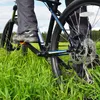Delhi-based Svayam is on a mission to make tourism more accessible for the differently abled
Founded in 2000, Sminu Jindal’s Svayam aims to make India more accessible for people with reduced mobility. The Delhi-based organisation has opened new horizons for the differently abled population to travel.
To travel is to evolve. Travelling is not just about seeing places but it is an experience; it is about meeting new people, and seeing different cultures. But most differently abled people who wish to travel often step back due to lack of proper facilities.
From basic infrastructure and suitable transportation to accessible toilets and sightseeing points, the disabled are being deprived of travel opportunities.
And leading the cause of accessibility on this front is Svayam, founded by Sminu Jindal (MD of Jindal Saw Ltd) in 2000. The Delhi-based organisation is dedicated towards informing the people working with the government and bringing all stakeholders on a single platform to create a barrier-free and inclusive world.
Started at a time when little or no attention was given to individuals with reduced mobility to travel, today Sminu and Svayam, which is a CSR initiative of Jindal SAW Ltd, has opened new horizons for India’s differently abled population to travel.
In 2008, Svayam created history by making Qutub Minar, the UNESCO World Heritage Site, accessible for all. It was also recognised and honoured for its work, as Svayam became the first organisation to be conferred with the National Tourism Award for Excellence, jointly received with Archaeological Survey of India (ASI).

Sminu Jindal's Svayam is dedicated towards informing the people working with the government and bringing all stakeholders on a single platform to create a barrier-free and inclusive world.
Svayam’s journey
Svayam’s motto - ‘Accessibility for All’ - encapsulates its belief that everyone, ranging from the elderly, to children, pregnant women, women with babies, people with physical injuries, and people with disabilities (PwDs), is entitled to use the public infrastructure in the same manner.
Perhaps the reason behind Svayam’s all-round success was Sminu’s attitude towards a life-changing event. At the tender age of eleven, Sminu, now 46, met with a nearly fatal accident that left her paralysed waist down. She used all the support available, and her will power and perseverance to rebuild herself into a resilient young woman, and then there was no looking back.
Today, her organisation seeks to raise awareness around the fact that it is not reduced mobility, but the lack of accessible public infrastructure that restricts people to move freely and contribute to the society and the nation.
According to the organisation, when everyone is born as equal, they should enjoy and use the services and infrastructure equally. And today, after 19 long years, the organisation has lakhs of people to support its mission.
Promoting accessible tourism
Over the years, Svayam has advocated for accessibility for all by implementing several on-ground and digital awareness campaigns, giving recommendations to the government, designing the accessibility guideline, actively engaging in standards formulation on accessibility and conducting numerous access audits around the world to make the public infrastructure accessible.
By doing the audit for archaeological sites, it has helped the government to facilitate accessibility in different sectors.
After ensuring Qutub Minar was made accessible to all, many other historical monuments across India such as the Red Fort, Taj Mahal, and Fatehpur Sikri were made accessible by Svayam in a joint collaboration with the ASI.
It has also undertaken access audits of monuments from different circles, and some of the prominent monuments include World Heritage sites in Delhi, Agra, and Aurangabad and other important monuments in Chandigarh, Jaipur, and Guwahati, to name a few.
Making travel safe
To make travel safer for the differently abled, Svayam entered an MoU with Delhi International Airport Limited (DIAL) under which regular staff training on handling the needs of passengers with reduced mobility are being conducted. It has also conducted access audits of Delhi Metro to make transportation accessible for disabled people.
“We have access audited 10 Delhi Metro stations on the invitation of the DMRC, and the new Bus Q Shelters in New Delhi,” Sminu tells YourStory.
She adds: “Since 2000, Svayam has also been working to make our transportation systems accessible for all. We are publishing sector-wise guidelines to help make infrastructure accessible; first of which, ‘How to make religious places accessible’ has already been published and released.”
The organisation has also been working towards improving air travel experiences of persons with disabilities and those with reduced mobility since 2007.
“We are working with the Ministry of Civil Aviation, GOI, and have submitted recommendations to revise existing DGCA-CAR to make air travel accessible for all,” adds Sminu.
Apart from air travel, it conducted an access audit of Cruise Tourism Terminal of New Mangalore Port Trust (Ministry of Shipping) on their request to ensure that this transportation medium too was accessible and inclusive.

Sminu Jindal's Svayam seeks to raise awareness around the fact that it is not reduced mobility but the lack of accessible public infrastructure that restricts people to move freely.
Encouraging young minds
Sminu says Svayam is committed towards changing the mindset of the society towards accessibility.
The organisation is constantly trying to engage with the youth to sensitise them on the issue of accessibility, which is visible in its collaboration with educational institutions such as the Indian Institute of Technology (IIT) Delhi, Bharatiya Vidya Bhavan’s Usha, Lakshmi Mittal Institute of Management, etc.
Svayam is a member of many prestigious committees in India, including the Core Committee on Accessible Tourism (Ministry of Tourism, Govt. of India), the Core Committee for Harmonized Guidelines on Accessibility, the Committee on Functional Requirements in Buildings of Bureau of Indian Standards (Govt. of India), and on the RDSO (Railway Board) Panel for Accessibility in Rail Transportation.
International exposure
Svayam has also made its presence felt internationally and is an integral part of various committees world over, such as Standing Committee on Accessible Transportation, and Mobility ABE60 of The Transportation Research Board of the National Academies, USA. It is also the permanent secretariat of TRANSED series of international conferences that happens every three years in different continents.
“On the research front, we have partnered with the Access Exchange International (AEI), USA, in developing of the World Bank’s Transit Access Training Tool Kit on safe bus driving, and held sensitisation sessions for DTC drivers and conductors to equip them to better address the special needs of passengers with disabilities. We have also done paratransit transport research on autorickshaws and carried out modification experiments and user testing at the Piaggio manufacturing facility,” Sminu adds.
Looking ahead...
In its 2011 declaration, the United Nations World Tourism Organisation predicted tourism will increase and experience sustained development, reaching 1.8 billion international tourists by 2030.
Accessible cities and tourism provisions, therefore, ensure the full social and economic inclusion of all persons with direct benefits of promoting more sustainable travel habits among users.
Svayam is currently working with water.org’s Indian arm FAAS to help make 1,500 accessible toilets in five states – Tamil Nadu, Karnataka, Maharashtra, Uttar Pradesh, and Odisha. This will run till 2021 and will help create a sustained and wide awareness, especially in rural areas.
(Edited by Megha Reddy)








